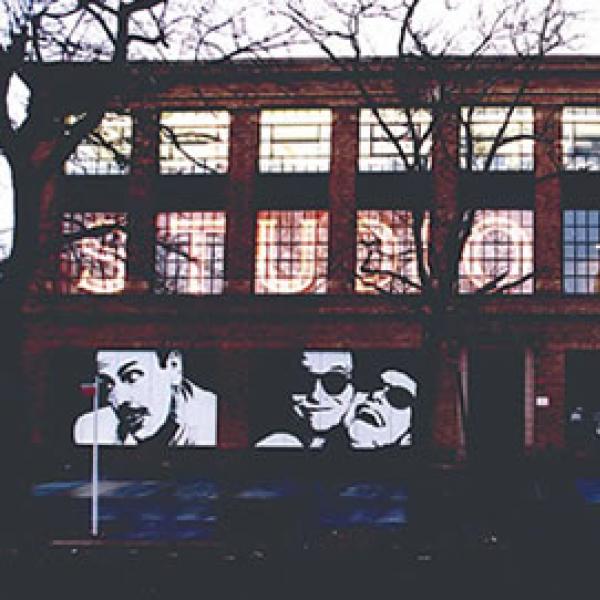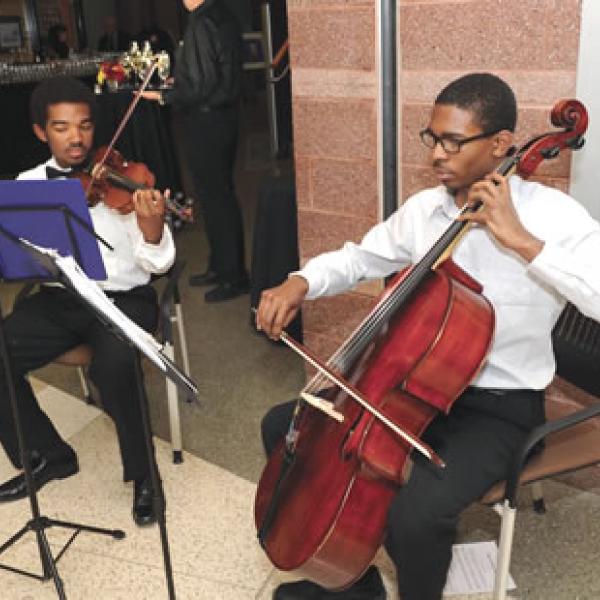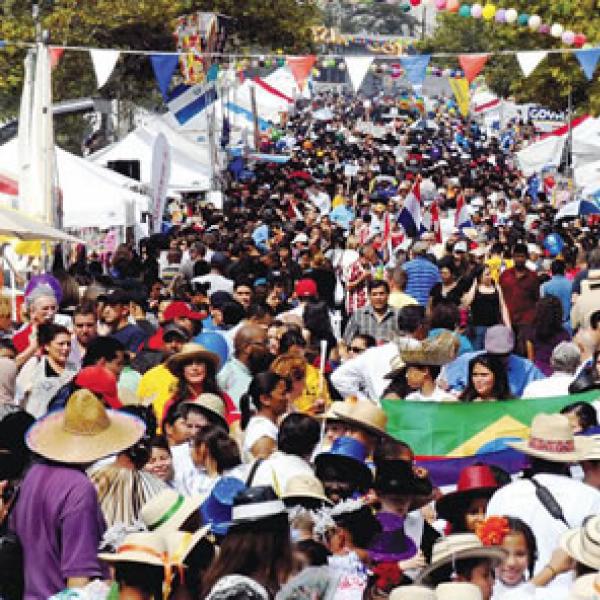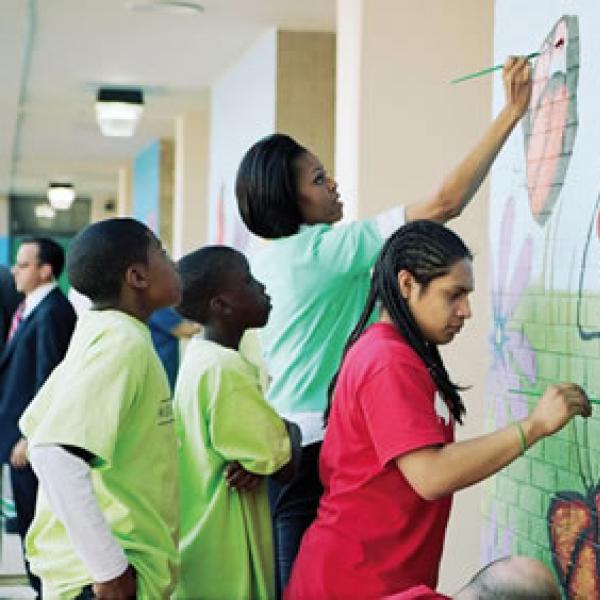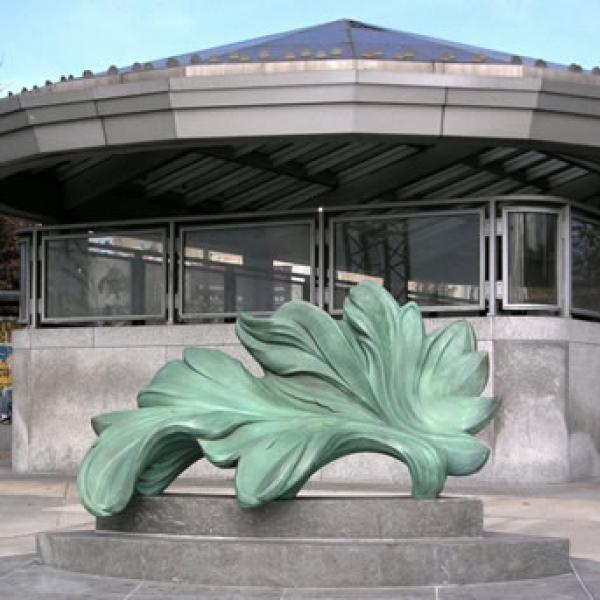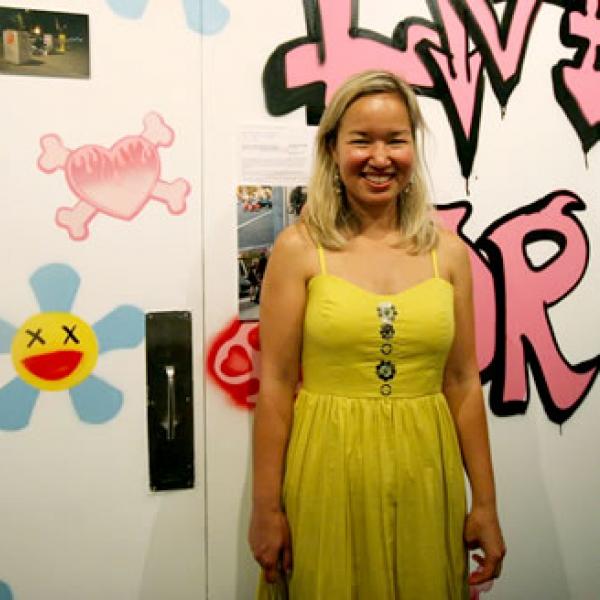Interview with Dr. Gail Kern Paster
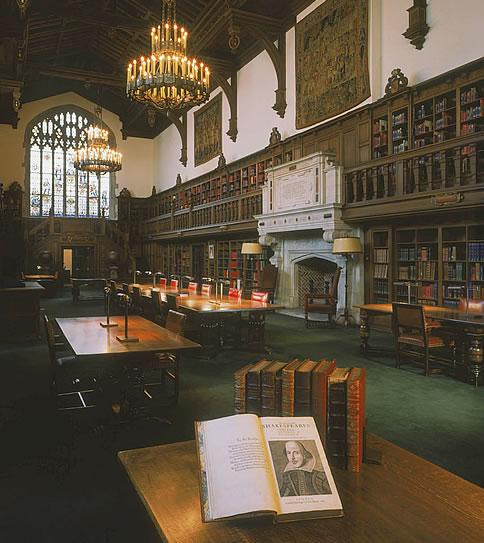
Inside the Folger Shakespeare Library. Photo courtesy of Folger Shakespeare Library
Dr. Gail Kern Paster, director of the Folger Shakespeare Library, discusses the Folger’s place in the DC community.
Jo Reed: Hi, I'm Josephine Reed with the National Endowment for the Arts. The Folger Shakespeare Library in Washington DC is home to the world's greatest collection of Shakespeare materials. I talked with Dr. Gail Kern Paster, Director of the Folger about its history and its place in the nation's capital.
Can we have a brief history of the Folger?
Gail Kern Paster: Henry Folger and his wife Emily Folger devoted themselves to amassing a Shakespeare collection. He was the President of Standard Oil, they had no children, they really poured their assets into the collection and on his retirement they decided that the collection needed to be housed in a permanent library, in a facility. They chose Washington; they chose Washington because they wanted their collection to be a gift to the American people. They chose a site near the Library of Congress, near the Capitol and they set about building this building. The sadness really was that Henry Folger laid the cornerstone for the building in 1930, did not live to see it completed. So he never enjoyed what visitors to the library enjoy today which is an experience of this glorious building, housing a glorious collection and with an array of public programs. I like to think that the Folgers would be totally delighted if they were able to time travel from their resting place in the vault at the Folger Library, if they could time travel and see us and see us on a day when we have kids performing Shakespeare on the stage. When we have fellows whom we support with endowed funds, doing research in the reading rooms where there's a seminar perhaps on some topic relating to early modern Europe going on in a seminar room. We have people publishing a Folger magazine, in other words, the place is hopping and all of these activities are really designed to further the mission and it's a mission that is expanded certainly from anything they would have envisioned and yet I think they would be thrilled.
Jo Reed: The Folger could have stayed in ?official Washington,? I'm using inverted commas here but you have really made it a point to integrate the Folger Shakespeare Library into the fabric of the Washington, DC community at-large.
Gail Kern Paster: We decided in the ?70s, encouraged by the Amherst College of Board of Trustees, because one of the facts of our life is that we are part of Amherst College. We were given to Amherst College by Henry Folger. We were really encouraged to look beyond our walls to the community and that is really the impetus for the performing arts component to our mission and for bringing the children in. So there is something going on, on our stage whether it's poetry readings or concerts or performances of productions or readings of PEN/Faulkner with whom we're affiliated. There's something going on, on our stage 200 nights a year and of course there's things going on during the day through exhibitions. So we are enormously busy both looking to serve the Washington community culturally, educationally and then as we were just talking about, digitally we can reach out to people well beyond our borders. So I think one of our goals for the future will be a library without walls.
Jo Reed: Say more about that.
Gail Kern Paster: Well for example let us assume that you might be a teacher and who's teaching Twelfth Night to a class and you want to give the kids a taste of research or you want to bring materials into the classroom yourself. But in any case you can go to the Folger online, you can go to our catalogue Hamlet online, you can type in Malvolio in cross garters and you will be able to have access to the illustrated material at the Folger Library that shows you the history of production for Twelfth Night that will give you a sense of the range for that or you can do the same thing with Hamlet. What has Hamlet looked like holding the skull of Yorick in productions over the past. So in that sense we try very hard to be a library without walls because in terms of having physical access to our collection, it is of course a library restricted to the advanced student, the doctoral level or college faculty. So we want of course to continue to support and nurture their research through physical access to the materials but we want those materials out there in the world.
Jo Reed: And you also go out there in the world, you have very vital programs with schools in the area.
Gail Kern Paster: Absolutely, we have a professional acting troupe called Bill's Buddies and Bill's Buddies goes into classrooms to perform scenes with kids and I do mean perform scenes with kids. So for example we have living iambic pentameter, Shakespeare's verse is in iambic pentameter, ten syllable lines but for the kids to know what iambic pentameter means it's really helpful to have them act it out, and so Cam McGee our wonderful head of Bill's Buddies, gets the kids to actually become themselves an iambic pentameter line, you can see it on YouTube actually, see what living iambic pentameter looks like and we go out to the schools of the metropolitan area, we work with teachers and then eventually the kids themselves work on their own scenes and come back to us and perform for each other. One school performing for another school on the stage and we do that for the high school kids in February and we do it for the middle schoolers in May and it's one of the most joyous parts of our year because the kids first of all are incredibly enthusiastic. We don't believe in having kids compete with one another, their success is being there and performing and so they perform for each other. We'll give out prizes maybe for best death or best audience but we certainly don't want to pit one school against another in terms of blue ribbons and first prize, second prize. That's not what it's about, it's really about the joy of performing, the joy of owning Shakespeare through performing Shakespeare and having the fun of getting up there and strutting your stuff and the kid's spend the day and we rotate the schools in and out so after a couple of years the schools have to take a break.
Jo Reed: And how do you find the kids respond to Shakespeare?
Gail Kern Paster: Well, you know, we have already gone to them and one of the first things we try to do is break down the fear. Now with the little kids I would say there's not a lot of fear really, with the older students they've gotten enough cues from the culture to know that Shakespeare's kind of a big deal and therefore who are they. But our mission is absolutely to make them feel as if they can be performers. They can own the language through understanding it and through performing it and at all levels and we find that the performances represent such creativity. I mean for example you might have a very ambitious school whether it's a middle school or a high school, decide that they're going to do a medley of scenes and I saw terrific medley of scenes this year with groups of two and three kids coming on stage and performing a bit of ?Taming of the Shrew? or ?Twelfth Night? or ?Richard the Third? or they can choose for their time on stage to do a sequence of scenes from one play and so I saw great group of kids a couple of years ago do the assassination scenes of Julius Caesar and the scenes before and after the assassination. This was a group of young kids who are actually in the juvenile justice system and they came and performed for us. It was a great day for them, it was a great day for us; I thought it was very, very, very moving.
Jo Reed: By embedding yourself so fully in the Washington community I think it's pretty clear what you give the community. Is it possible to talk about what you get from the community in return?
Gail Kern Paster: Certainly we get their support and one of the things that we really want is for people to become members of our library, by members I mean people who come to all of our activities, who come to exhibition openings so that they give back to us through membership. We have a very special relationship with our neighbors on Capitol Hill; we want very much to be their good neighbors. We open the Folger on the Sunday nearest Shakespeare's birthday to a birthday party for Shakespeare. We open up the whole library, we have sword fight demonstrations, we have curtseying lessons, we have Shakespeare portrait painting contests for kids and so the community comes and visits us, we give of ourselves to them. I think it's a wonderful example of neighborhood relations and they're our primary audience, I mean they come and see, you know, small stage theater on our stage and so I do think that we get an enormous amount from their enthusiasm and their participation.
Jo Reed: It's interesting because I think your stage is sort of paradigmatic of the library in a sense because it's such an intimate stage and an intimate audience and I think it gives the sense of being a theater that's embedded in a community.
Gail Kern Paster: Absolutely, I mean it's a small theater, it holds 240 people, some of the seats are a little perhaps restricted sightlines but in fact what's wonderful about being at the Folger is that the action is really taking place around you, there is no, I mean to hear Hamlet saying ?to be or not to be? is right down in front of you and he's speaking to you and you know that he's speaking to you and the immediacy and the intimacy of our space is remarkable. Which is not to say that Shakespeare can't be performed on a big stage and for a big auditorium, of course it can be and is all the time, but we do think that something very special is accomplished by having a small scale intimate Shakespeare and it's enormously accessible, whether we're doing A Comedy of Errors or whether we're doing Hamlet or whether we're doing as we did this fall, we did a Much Ado About Nothing set in a Washington, set in today, set in Washington DC in a Caribbean neighborhood, very diverse cast, very diverse audiences that with musical background provided by Afropop and I love that production and one of the reasons I love that production is that it showed Washington a version of itself through the Shakespeare text. But it also brought something out that I thought was very meaningful in Much Ado About Nothing. Much Ado About Nothing is a play that involves gossip, it involves men gossiping with each other, it involves women gossiping with each other, it involves overhearing and eavesdropping and the neighborhood watch, in other words in intensely interested in neighborhood relations and to set it in a Washington, DC neighborhood absolutely brought out the intimacy of downtown living as reflected in a Shakespeare comedy. So I thought it was a great match and I loved it.
Jo Reed: That was Dr. Gail Kern Paster, Director of the Folger Shakespeare Library. For the National Endowment for the Arts, I'm Josephine Reed. Thanks for listening.


